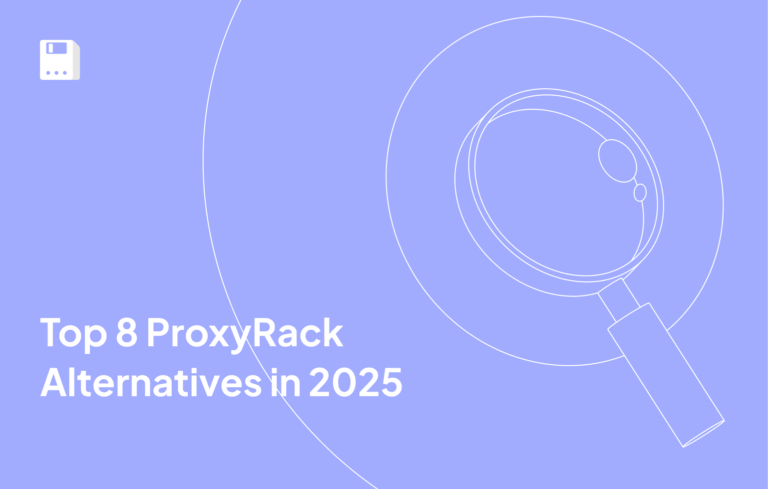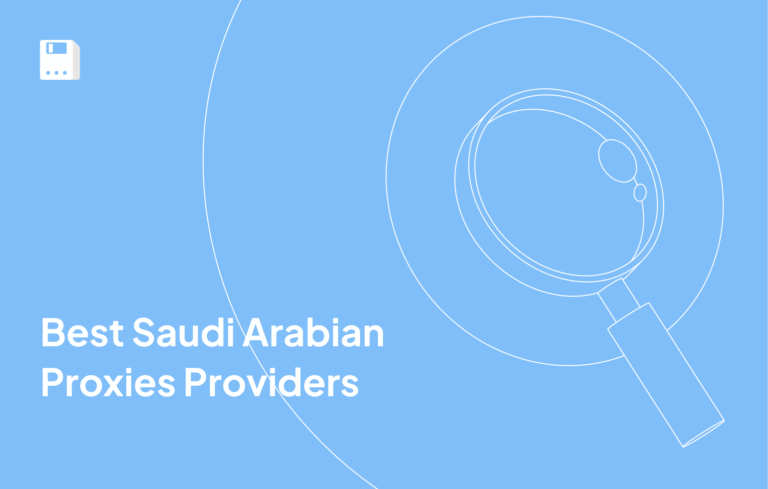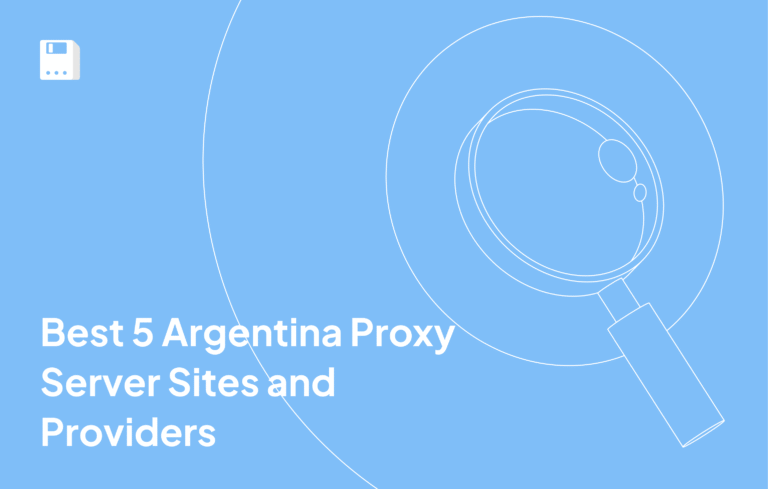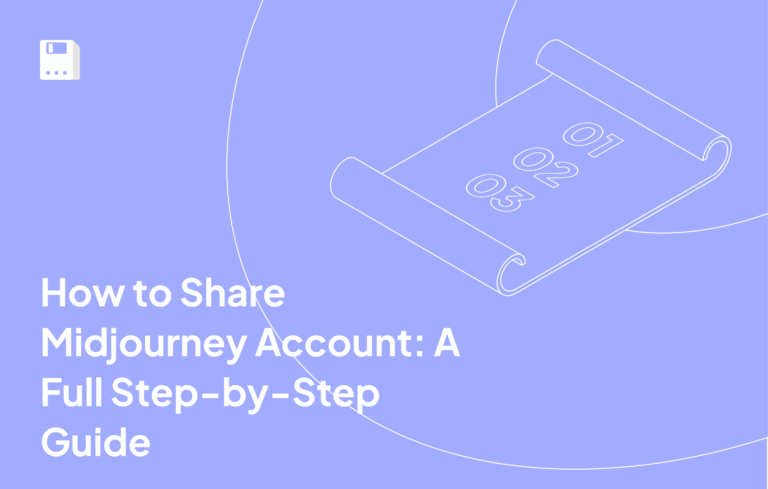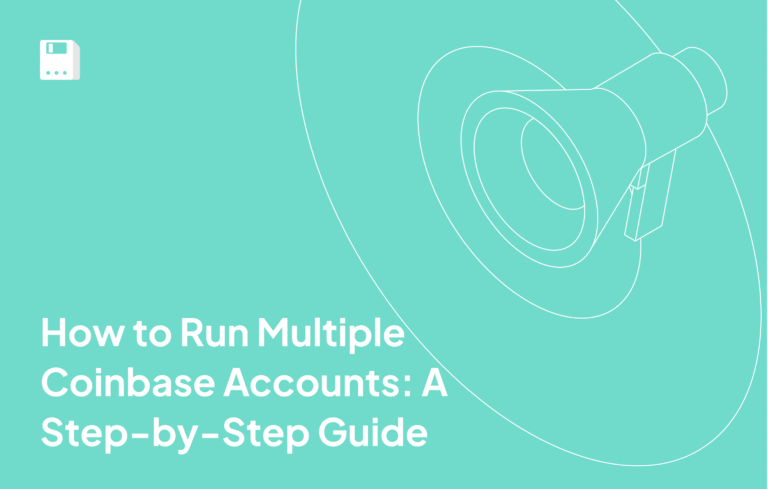If you’re here, chances are ProxyRack has caught your eye, but something about it didn’t quite click when you gave it a shot.
Maybe it’s the limited IP pool, or maybe it’s the sluggish performance that made your web scraping experience very frustrating.
Sure, the pricing looks appealing on the surface, and the platform covers over 140 countries with around 600K IPs.
But when you’re running serious operations, that “just enough” starts to feel more like “not quite.”
That’s why I went down the rabbit hole and explored some ProxyRack alternatives that are actually better in ways that count.
Here’s a TL;DR table to compare all your options at a glance. For a detailed comparison, read the full blog.
TL;DR
| Provider | IP Pool Size | Countries Covered | Starting Price | Free Trial | Proxy Types |
| FloppyData | 65M+ | 195+ | $2.95/GB | ❌ No | Residential, Mobile, Datacenter |
| Massive Proxies | 1.2M+ | 195+ | $3.99/GB | ❌ No | Residential, ISP |
| SOAX | 191M+ | 195+ | $90/month | ❌ No | Residential, Mobile, ISP, Datacenter |
| NetNut | 85M+ | 195+ | $99/month | ✅ Yes (7 days) | Residential, ISP, Datacenter, Mobile |
| Oxylabs | 177M+ | 195+ | $4/GB | ✅ Yes | Residential, Mobile, ISP, Datacenter |
| B2Proxy | 80M+ | 195+ | $4/month | ❌ No | Residential, ISP |
| ProxyOmega | 45M+ | 195+ | $4.00/GB | ❌ No | Residential, Mobile, IPv6 |
| MangoProxy | 90M+ | 200+ | $5.2/GB | ❌ No | Residential, ISP, Datacenter |
| ProxyRack | 600K | 140+ | $49.95/month | ❌ No | Residential, Mobile, Datacenter |
What is ProxyRack?
To begin, ProxyRack mainly serves purposes such as data collection and web scraping, so if that’s your thing, you’ll probably find it checks most of the right boxes.
But I didn’t stop there. I tested it across different platforms just to see how flexible it really is, and turns out, it works with Discord too.
As for ProxyRack’s variety of plans, they’re structured in a way that lets you pick based on the kind of load you’re running.
For example, some residential proxy packages are priced around how many simultaneous connections you can make.
There’s also an unmetered plan, though it offers fewer IPs, it removes bandwidth limits altogether. If you know what you’re doing, that trade-off might work in your favor.
You also get the choice between rotating and sticky IPs. I tested both. With rotating IPs, every connection generates a fresh IP. Sticky IPs, on the other hand, let you hang onto one IP for longer periods:
- Up to 10 minutes for residential
- 30 minutes for datacenter proxies
However, all this flexibility does come with trade-offs.
ProxyRack is more affordable than a lot of its competitors, which is great, but it falls behind in certain areas.
The size of its IP pool is smaller than that of more established proxies.
The latency and success rates can also be substandard.
| Features | Details |
| Total Available IPs | 600K |
| Proxy Types | Residential, Mobile, Datacenter |
| Geographic Distribution | 140+ countries |
| IP Targeting Precision | Country, City, ISP |
| ASN/Coordinates Targeting | Available |
| Free Trial | No |
| Unlimited bandwidth | Select plans |
| Success Rate | 90% |
| Average Response Time | 0.26s-1.35s |
| IP Rotation | Automatic |
| Supported Protocols | HTTP, HTTPS, SOCKS4, SOCKS5, and UDP |
| 24/7 Support | Yes |
Pricing Details
- Residential Proxies: starts at $49.95/month (10GB)
- Datacenter Proxies: starts at $150/month (100 threads)
- Mobile Proxies: starts at $35/month (50GB)
Pros & Cons
| Pros | Cons |
| Unlimited bandwidth | Low success rate relatively |
| SOCKS5 support included (datacenter plan) | Higher latency compared to competitors |
| Affordable pricing plans | Smaller IP pool than top competitors |
| Positive rating on TrustPilot | |
| Residential and datacenter options | |
| Unlimited thread support | |
| Docker and API integration ready |
Top 8 ProxyRack Alternatives
If ProxyRack didn’t quite hit the mark for you, you have other options to switch to.
After testing a number of ProxyRack competitors, I’ve shortlisted eight that stood out in various areas.
Explore them and you’ll likely find a better fit here.
Floppydata (Best ProxyRack Alternative)
FloppyData is the one I’d start with because I found it to be the best ProxyRack alternative.
I tested it with several automation and scraping tools, and my experience was surprisingly smooth from setup to execution.
The user dashboard is simple enough that even first-time users won’t get lost. Within minutes, I was able to pick a location, generate proxy credentials, and get started.
FloppyData offers residential, mobile, and datacenter proxies, all sourced through actual devices.
I found that the risk of detection and blocks, especially on platforms like Facebook, Instagram, and Twitter was significantly low.
One thing I appreciated during my testing is that there are no concurrent session limits. So if you’re managing several browser instances or bots at once, say for Facebook automation or Telegram scraping, you won’t run into connection issues.
If you’re willing to try it out, here’s how to set up FloppyData proxies:
- Head over to the FloppyData website.
- Click the Get Started button in the top right corner.
- Fill in your basic info.
- Visit the verification link in your email inbox to activate your account.
- After successful login, go to the Create Proxy Pool section.
- Choose your preferred location (make sure it’s a country where Telegram works, like the US), select SOCKS5, and fill in the other details like how many proxies you want.
- Hit the Buy to create button. You’ll then see your proxy list in the Dashboard, complete with proxy host, username, password, and port info for each.
Key Features
| Features | Details |
| Total Available IPs | 65 Million+ |
| Proxy Types | Residential, Mobile, Datacenter |
| Geographic Distribution | 195+ countries |
| IP Targeting Precision | Country, City, State, ASN / ISP targeting |
| ASN/Coordinates Targeting | Available |
| Free Trial | No |
| Unlimited bandwidth | Yes |
| Success Rate | 99.99% |
| Average Response Time | 0.3s |
| IP Rotation | Automatic, Per Request |
| Supported Protocols | HTTP, HTTPS, SOCKS5 |
| 24/7 Support | Yes (Live chat, Email, Telegram) |
Pricing Details
FloppyData keeps its pricing flexible with a pay-as-you-go (PAYG) model.
Current pricing looks like this:
- Residential Proxies: $2.95/GB
- Mobile Proxies: $2.95/GB
- Datacenter Proxies: $0.90/GB
- High-volume Packages: From $2/GB
They’ve also updated their subscription management system to make everything easier to handle.
You can now combine multiple proxy types into one subscription, view billing details at a glance, and download crypto payment receipts.
Pros & Cons
| PROS | CONS |
| 99.9% network uptime | Slightly smaller IP pool than competitors like Oxylabs, and NetNut |
| Extremely fast response times (0.3s avg) | |
| Quick setup & ridiculously low error rates | |
| Little to no learning curve, easy-to-navigate user interface | |
| Free public proxy list | |
| Bandwidth and concurrency is unlimited | |
| Rotating and sticky sessions supported | |
| Proxy checker, and chrome extension comes free | |
| Full anti-detect browser compatibility | |
| PAYG + crypto payment support | |
| There’s no expiry on unused data | |
| Live support via Discord, email, and chat |
Massive Proxies
Massive Proxies started out during the crypto mining boom to offer a monetization method via its SDK.
That SDK is still present today but now repurposed for traffic proxying.
Developers can integrate it into their apps to monetize the app user’s bandwidth, which is how Massive sources its residential IPs.
This method of sourcing IPs isn’t new, but Massive has been more transparent about it than most, something I appreciated while testing the service.
Massive’s residential pool gives decent success rates and low latency, while its ISP proxies, though only available in the US, offered the fastest response times in my tests.
What else stood out for me was the ability to target specific device types. You can filter down to phones, laptops, and even TVs.
Moreover, their IP pool, while not huge, is clean. Most IPs I checked were residential. Very few of them belonged to universities, businesses, or data centers.
That said, Massive doesn’t go wide with its offerings. It sticks to residential and ISP proxies. There’s no datacenter or mobile options, which might limit its use for some of you depending on the project.
Key Features
| Features | Details |
| Total Available IPs | 20,000+ U.S. static ISP IPs, 1 Million+ Residential |
| Proxy Types | Residential, ISP |
| Geographic Distribution | 195+ countries |
| IP Targeting Precision | City, State, ZIP |
| ASN/Coordinates Targeting | Available |
| Free Trial | No |
| Unlimited Bandwidth | No |
| Success Rate | 99.8% |
| Average Response Time | 0.6s |
| IP Rotation | Automatic |
| Supported Protocols | HTTP, HTTPS, SOCKS5 |
| 24/7 Support | On select plans (email + Slack) |
Pricing Details
- Residential Proxies: starts at $3.99/GB/month
- ISP Proxies: starts at $30/month (10 IPs)
Pros & Cons
| Pros | Cons |
| Bandwidth rollover adds value by carrying over unused data | IP pool size (~1M) is smaller than most ProxyRack competitors |
| No mobile or datacenter proxies | |
| No PAYG plan |
SOAX
SOAX is another name that comes up often when you’re exploring ProxyRack competitors, though my experience with it was mixed.
On paper, it’s well-equipped.
The company offers a full proxy stack, including residential, mobile, datacenter, and ISP proxies, along with a few scraping APIs and a no-code AI scraper.
But as I dug deeper, I found areas where it lags.
For instance, SOAX doesn’t clearly state how it sources its IPs.
It uses SDKs similar to other providers, often through free VPN apps or partner platforms, but the lack of transparency isn’t ideal.
That said, the proxy variety is decent, and you get SOCKS5 support across the board with high bandwidth ceilings of 20 Gbps per port in some cases.
This let me run thousands of concurrent threads without any real hiccups.
During testing, the ISP proxy coverage was limited to the US, but the residential and mobile networks spanned most countries.
However, there was no IP whitelisting at the time of testing, company info couldn’t be added, and usage stats were fairly bare-bones.
Support was a decent experience. The live chat includes a bot, but you can get through to a human quickly, and response times were generally fast during European hours. So, no major complaints there.
Key Features
| Features | Details |
| Total Available IPs | 191 Million+ |
| Proxy Types | Residential, Mobile, ISP, Datacenter |
| Geographic Distribution | 195+ countries |
| IP Targeting Precision | Country, Region, City, US ISP |
| ASN/Coordinates Targeting | Not available |
| Free Trial | No |
| Unlimited Bandwidth | No |
| Success Rate | 99.5% |
| Average Response Time | 0.55s |
| IP Rotation | Automatic, Custom intervals |
| Supported Protocols | HTTP(S), SOCKS5, UDP, QUIC |
| 24/7 Support | Yes (live chat, email, phone, Telegram) |
Pricing Details
- Residential Proxies: starts from $90/month (25GB)
- Mobile Proxies: starts from $90/month (25GB)
- US ISP Proxies: starts from $90/month (30GB)
- Datacenter Proxies: starts from $90/month (145GB)
Pros & Cons
| Pros | Cons |
| Good customer support with live chat handoff | IP pool size smaller than advertised |
| Strong filtering options: city, ASN, pool filters | Slower response times in Asia-Pacific |
| SOCKS5 with UDP support included | Limited infrastructure outside US and EU |
| Pay-as-you-go and subscription models |
NetNut
NetNut offers a good selection of rotating proxy networks and a few web scraping APIs alongside them.
Its main product is residential proxies, which come through what they describe as a proprietary reflection technology. After testing them, I’d say it’s just a fancy term for sourcing IPs from real devices.
There are also mobile proxies in the mix, and while you can rotate them with each connection or keep sticky sessions, you don’t get control over how long a session lasts.
NetNut’s geographic coverage is fairly wide too, with options to filter by city and ASN. On paper, that gives you enough control, but the experience of actually using it held me back a bit.
The dashboard feels like NetNut built it for enterprise clients first. You can see your active plans and usage stats, buy new subscriptions, and download invoices, but it’s not intuitive.
Customer support was another weak spot during testing. Emails took more than an hour to get a reply, and live chat wait times were around two hours during business hours in Israel.
Key Features
| Features | Details |
| Total Available IPs | 85 Million+ |
| Proxy Types | Residential, Mobile, ISP, Datacenter |
| Geographic Distribution | 195+ countries |
| IP Targeting Precision | Country, State, City |
| ASN/Coordinates Targeting | No |
| Free Trial | 7-day |
| Unlimited Bandwidth | No |
| Success Rate | 98.15% |
| Average Response Time | 1.2s |
| IP Rotation | Automatic |
| Supported Protocols | HTTP, HTTPS, SOCKS |
| 24/7 Support | Yes (email) |
Pricing Details
- Rotating Residential: Starts at $99/month (28GB)
- Static Residential (ISP): Starts at $99/month (7GB)
- Mobile Proxies: Starts at $99/month (13GB)
- Datacenter Proxies: Starts at $100/month (100GB)
Pros & Cons
| Pros | Cons |
| One-week free trial available | No pay-as-you-go option |
| Large residential IP pool | High starting prices |
| Fast static proxies sourced from ISPs | Basic dashboard and support portal |
| Positive user reviews | Email-only support on cheaper plans |
| Good value at scale | Live support available only during Israeli working hours |
Oxylabs
Oxylabs is easily one of the largest proxy providers, with plans geared primarily toward businesses.
The website is polished, the feature set is extensive, and you even get access to a dedicated account manager along with certifications and insurance for its products. All of this, of course, comes at a premium.
During my testing, Oxylabs proved itself as an enterprise-grade tool.
Its proxy coverage is impressive. You can choose from residential, mobile, datacenter, and ISP proxies, with massive IP pools.
The residential and ISP proxies performed particularly well in terms of stability and low latency.
That said, the enterprise focus means you’ll likely need some prior experience to get the most out of the tools. And since it’s pricey, you’ll want to closely monitor usage if budget is a concern.
For support, Oxylabs’ dashboard contains two contact points:
- One for account managers via email (slow)
- One for immediate help through live chat (useful replies within minutes)
Key Features
| Features | Details |
| Total Available IPs | 177 Million+ |
| Proxy Types | Residential, Mobile, ISP, Datacenter |
| Geographic Distribution | 195+ countries |
| IP Targeting Precision | Continent, Country, State, City, Coordinates, ASN |
| ASN/Coordinates Targeting | Yes |
| Free Trial | Yes |
| Unlimited Bandwidth | No |
| Success Rate | 99.82% |
| Average Response Time | 0.41s-1.1s |
| IP Rotation | Automatic, Custom interval |
| Supported Protocols | HTTP, HTTPS, SOCKS5 |
| 24/7 Support | Yes |
Pricing Details
- Residential Proxies: $4/GB (50 GB)
- ISP Proxies: $16/month (10 IPs)
- Mobile Proxies: $9/GB (50 GB)
- Datacenter Proxies: $180/month (200 IPs)
- Dedicated Datacenter Proxies: $6.75/month (3 IPs)
Pros & Cons
| Pros | Cons |
| Free trial available | Expensive compared to other options |
| Large global IP network | Steep learning curve for new users |
| Highly responsive 24/7 live chat | Not as user-friendly as smaller consumer platforms |
| Advanced scraping tools and APIs | One-product-at-a-time dashboard experience |
| Chrome extension and third-party integration |
B2Proxy
I gave B2Proxy a try because I was looking for a more affordable option in the residential proxy space.
The provider’s lineup is simple.
You’ve got:
- Standard residential proxies charged per GB
- Unlimited residential plans priced daily
- ISP static proxies billed by the IP
I tested residential proxies for web scraping and market research tasks. They did the job well enough with decent uptime, clean IPs, and no major bans.
The ISP proxies come with static IPs in over 30 locations. I found the IP quality decent, but performance varied a bit by location.
Dashboard-wise, it’s actually pretty clean and easy to use.
Transparency in pricing is also good, but the actual cost per GB does fluctuate depending on package size, so it requires a little math to figure out what you’re actually paying.
Key Features
| Features | Details |
| Total Available IPs | 80 Million+ |
| Proxy Types | Residential, ISP |
| Geographic Distribution | 195+ countries |
| IP Targeting Precision | Country, State, City |
| ASN/Coordinates Targeting | No |
| Free Trial | No |
| Unlimited Bandwidth | Yes |
| Success Rate | 99.95% |
| Average Response Time | 0.5s |
| IP Rotation | Automatic, Custom interval |
| Supported Protocols | HTTP, HTTPS, SOCKS5 |
| 24/7 Support | No |
Pricing Details
- Residential Proxies: Starts at $4/month (5 GB)
- Unlimited Residential: Starts at $235/day
- ISP Proxies: $5-14/IP/month
Pros & Cons
| Pros | Cons |
| Native broadband IPs for higher anonymity | No free trial |
| Ethical and diverse IP sourcing | Variable per-GB pricing can get confusing |
| Intuitive, beginner-friendly dashboard |
ProxyOmega
ProxyOmega caught my eye more out of curiosity than anything else.
It’s relatively a new proxy, so I didn’t expect it to go toe-to-toe with big ProxyRack Alternatives but I still wanted to see what kind of experience it could offer.
The platform gives you a mix of residential and datacenter proxies.
I tested the Platinum Residential plan first, which taps into a 45M+ IP pool and uses a pay-per-GB model. The proxies weren’t the fastest, but they held up for basic scraping tasks. There were occasional hiccups in speed, and IP rotation felt a bit clunky, but it worked fine for non-intensive jobs.
The Unlimited Residential options have hybrid subnet models and a higher-tier “Executive” plan with 250 concurrent connections and truly unlimited data.
I didn’t test the Executive plan (the price is steep), but I can see it being useful if you’re dealing with massive data pulls and want fixed concurrency.
For mobile proxies, they offer real carrier IPs and some IPv6 support, which is good if you’re looking for next-gen protocol compatibility, but performance here was average at best.
Support is available 24/7 through the dashboard’s ticket system. That said, unless you’re on one of the premium plans, response times can be slow. I had a ticket answered after 6 hours.
Also, two-factor authentication is mandatory, which is annoying if you’re working with a team.
Key Features
| Features | Details |
| Total Available IPs | 45 Million+ |
| Proxy Types | Residential, Mobile, IPv6 |
| Geographic Distribution | 195+ countries |
| IP Targeting Precision | Country, State, City |
| ASN/Coordinates Targeting | No |
| Free Trial | No |
| Unlimited Bandwidth | Select plans |
| Success Rate | 99.9% |
| Average Response Time | 0.5s |
| IP Rotation | Automatic, Per Month or Per Request |
| Supported Protocols | HTTP, HTTPS, SOCKS5 |
| 24/7 Support | Select plans |
Pricing Details
- Unlimited Residential: $51.99 per port/month
- Premium Unlimited Residential: $2,499/month
- Platinum Residential: $4.00/GB
- Mobile Proxies: $5.80/GB
- IPv6 Network: $7.00/day
Pros & Cons
| Pros | Cons |
| Helpful support if you’re lucky | IP pool is relatively small |
| Offers IPv6 support | Proxy speeds are inconsistent |
| 24/7 support only for premium plans |
Mango Proxy
Mango Proxy also launched in early 2023, and judging by the domain registration, it only recently started taking itself seriously.
But I gave it a fair shot, and while the offering is still maturing, there are some things that stood out.
First off, the IP pool is over 90 million IPs sourced from 200+ countries. That’s a number you’d usually expect from older, more established providers.
I checked the speed and consistency across a few regions, and for basic scraping and light automation tasks, the performance was stable.
That said, you’re limited to residential IPs only. There’s no support for mobile proxies.
Mango Proxy gives you firm control over session management. You can rotate IPs every minute or stretch that session out to two hours. If you’re running a task that suddenly needs a fresh IP, there’s also a one-click manual rotation option.
I also appreciated the option to whitelist and save proxies based on filters like speed or location. With this feature you can build a consistent set of IPs that perform well with a particular target, instead of testing IPs every time.
Key Features
| Features | Details |
| Total Available IPs | 90 Million+ |
| Proxy Types | Residential, ISP, Datacenter |
| Geographic Distribution | 200+ countries |
| IP Targeting Precision | Country, City, Zip code, ASN |
| ASN/Coordinates Targeting | Yes |
| Free Trial | No |
| Unlimited Bandwidth | No |
| Success Rate | 99.95% |
| Average Response Time | 0.7s |
| IP Rotation | Automatic & Manual |
| Supported Protocols | HTTP, HTTPS, SOCKS5 |
| 24/7 Support | Select plans |
Pricing Details
- Residential Proxy: starts at $5.2/GB (5GB)
- Dynamic ISP Proxy: starts at $2/GB (10GB)
- Datacenter Proxy: starts at $1.5/GB (10GB)
Pros & Cons
| Pros | Cons |
| UDP protocol support | No mobile proxies |
| Large IP pool and wide geo-coverage | Lack of extra tools |
| Rotating and sticky session options | |
| Good reputation on review platforms | |
| Honest and transparent response time claim |
Comparing Proxy Performance
The table below shows success rates, average response time, and fraud score (from the global IP pool) of these proxy providers.
| Provider | Success Rate | Avg. Response Time | Fraud Score |
| FloppyData | 99.99% | 0.3s | 33 |
| Massive Proxies | 99.8% | 0.6s | 52.71 |
| SOAX | 99.5% | 0.55s | 33.96 |
| NetNut | 98.15% | 1.2s | 44.37 |
| Oxylabs | 99.82% | 0.41s | 40 |
| B2Proxy | 99.95% | 0.5s | 42 |
| ProxyOmega | 99.9% | 0.5s | 39 |
| Mango Proxy | 99.95% | 0.7s | 33 |
| ProxyRack | 90% | 0.26s-1.35s | 38 |
Let me Point You in The Right Direction…
Look, ProxyRack isn’t terrible. It does what it says, and for many users, it might even be enough.
But enough isn’t always good enough, especially if you’re working at scale or need more than the bare minimum.
In this guide, I’ve walked you through several standout ProxyRack alternatives.
But if I had to point you in one direction, FloppyData is that direction.
It’s affordable, fast, and scales up and down without draining your budget or your patience.
If that sounds like what you’ve been looking for, go ahead.
Sign up for FloppyData for an enterprise-grade experience minus the enterprise pricing.
FAQ
Why is FloppyData considered the top ProxyRack alternative?
FloppyData stands out with nearly 100% uptime, ultra-fast ~0.3 s response, a vast IP pool across 195+ countries, flexible pay-as-you-go pricing, clean IPs (~95% purity), and support for residential, mobile, and datacenter proxies - all delivered through a user-friendly interface.
Which other alternatives offer notable advantages?
Bright Data: Largest proxy pool (150M+), high success rates (~99.95%), extensive geo-targeting, and a free trial. Oxylabs: Enterprise-grade reliability with low latency (~0.6 s) and exceptional customer support.
Share this article:
Table of Contents
Proxies at $1
Get unlimited possibilities

